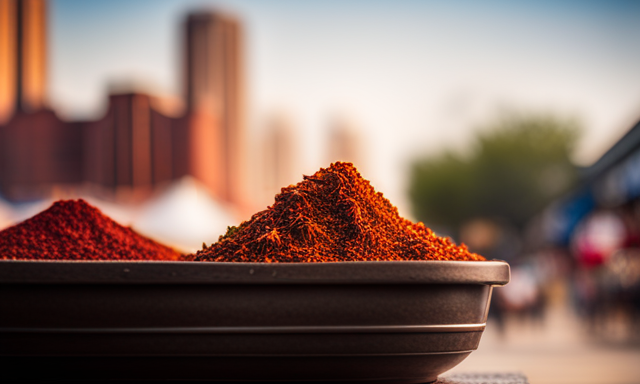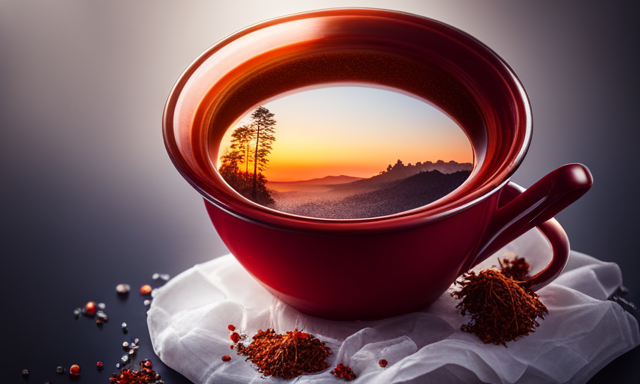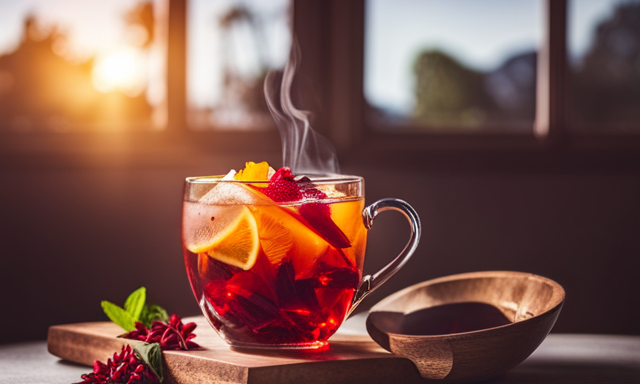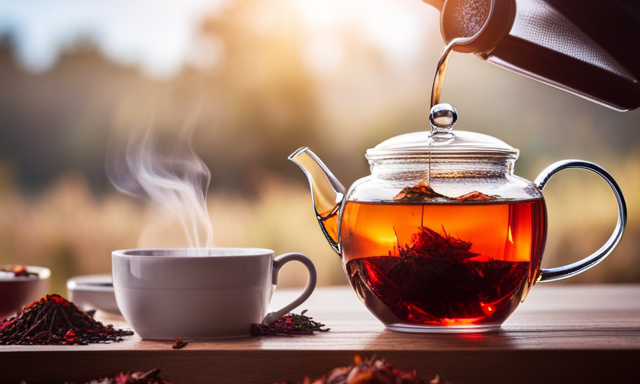I love tea. There’s something about the comforting warmth and soothing aroma that just makes any day better. But with so many types and flavors to choose from, it can be overwhelming to decide which one to sip on. That’s why I’m here to shed some light on the differences between black tea and rooibos tea.
Black tea and rooibos tea both have unique origins, distinct processing methods, and their own flavor profiles. While black tea comes from the Camellia sinensis plant and undergoes a fermentation process, rooibos tea is made from the Aspalathus linearis plant and is completely caffeine-free.
In this article, we’ll dive deeper into the intricacies of these two teas, exploring their health benefits, culinary uses, and cultural significance. Whether you’re a tea connoisseur or just curious about expanding your tea horizons, understanding the difference between black tea and rooibos tea will help you make an informed choice and discover the perfect cuppa for you.
So grab your favorite mug and let’s explore the world of tea together.
Key Takeaways
- Health benefits: Rooibos tea supports heart health, improves digestion, boosts the immune system, and has anti-inflammatory properties, while black tea is known for its antioxidant properties.
- Preparation techniques: Rooibos tea requires a longer steeping time for sweeter and earthy flavors, enhancing the release of antioxidants, while black tea is prepared by steeping leaves in hot water.
- Culinary uses: Rooibos tea adds a unique twist to sweet and savory recipes, used in baking breads, marinades, and sauces, and enhances the taste profile of dishes, while black tea adds depth and complexity to sweet and savory dishes, complements creamy desserts, and creates a harmonious contrast when paired with cheese.
- Personal preferences: Black tea has a stronger and more pronounced flavor with a slightly bitter or astringent aftertaste, while rooibos tea has a milder taste, is naturally caffeine-free, and has a sweeter finish.
Origins of Black Tea and Rooibos Tea
The origins of black tea and rooibos tea can take your taste buds on a delightful journey. Black tea hails from the Camellia sinensis plant, which is native to China and India. It undergoes a rigorous processing method that involves withering, rolling, oxidation, and drying. This process gives black tea its rich, robust flavor profile, with notes of malt and a slightly astringent taste.
On the other hand, rooibos tea comes from the Aspalathus linearis plant, which is indigenous to South Africa. Unlike black tea, rooibos tea does not undergo oxidation. Instead, it goes through a simple processing method of cutting, bruising, and fermentation. This results in a naturally sweet and nutty flavor profile, with hints of caramel and vanilla.
Now, let’s dive into the fascinating world of processing methods for these two teas.
Processing Methods
When it comes to how they are made, you’ll be amazed at the contrasting processing methods used for black tea and rooibos tea. Black tea is made from the leaves of the Camellia sinensis plant, which are withered, rolled, fermented, and then dried. This process gives black tea its bold flavor and dark color. On the other hand, rooibos tea is made from the leaves of the Aspalathus linearis plant, which are simply harvested, bruised, and then left to oxidize in the sun. This oxidation process gives rooibos tea its unique reddish-brown color and sweet, nutty flavor. In terms of health benefits, black tea is rich in antioxidants and has been linked to heart health and improved digestion. Rooibos tea, on the other hand, is caffeine-free and contains high levels of antioxidants that may help boost the immune system. Moving on to flavor profiles, let’s explore the distinct tastes of these two teas.
Flavor Profiles
Indulge your taste buds in a symphony of flavors that dance on your palate, as you savor the rich, robust notes of black tea and the warm, velvety embrace of rooibos tea. Each tea offers a unique flavor profile that caters to personal preferences.
Black tea: Known for its bold and malty taste, black tea often exhibits hints of caramel, chocolate, or even fruity undertones. Its robust nature makes it a perfect choice for those who enjoy a strong and full-bodied beverage.
Rooibos tea: This caffeine-free herbal tea boasts a smooth and naturally sweet flavor. With notes of vanilla, honey, and a gentle nuttiness, it provides a comforting and cozy experience. Rooibos tea is an excellent option for those who prefer a milder and more delicate taste.
Transitioning into the next section about caffeine content, it’s important to consider how these distinct flavor profiles interact with the energizing properties of the teas.
Caffeine Content
I’m going to talk about the caffeine content in black tea and the caffeine-free nature of rooibos tea.
Black tea is known for its high caffeine content, making it a popular choice for those seeking an energy boost.
On the other hand, rooibos tea is naturally caffeine-free, making it a great option for individuals looking for a soothing and relaxing beverage without the stimulating effects of caffeine.
Understanding the caffeine content in different types of tea can help you choose the perfect brew to suit your needs and preferences.
High caffeine content in black tea
You’ll be surprised by how much energy you’ll get from a cup of black tea due to its high caffeine content. Black tea is known for its stimulating effects, making it a popular choice for those seeking an alternative to high caffeine beverages like coffee or energy drinks.
However, it’s important to note that consuming high levels of caffeine can have potential health risks, such as increased heart rate, anxiety, and sleep disturbances. It’s always recommended to consume caffeine in moderation and be aware of your own tolerance.
Now, let’s explore the caffeine-free nature of rooibos tea, which offers a refreshing and calming alternative to black tea.
Caffeine-free nature of rooibos tea
Rooibos tea, also known as red tea, is a caffeine-free alternative that offers a multitude of health benefits. It has a high antioxidant content, which is five times greater than green tea. This naturally sweet and earthy tea is derived from the leaves of the Aspalathus linearis plant, native to the Cederberg region of South Africa. Unlike black tea, which undergoes fermentation, rooibos tea is unfermented, preserving its natural properties.
When it comes to preparation, rooibos tea can be enjoyed in both hot and iced forms. For a hot cup, steep the leaves in boiling water for about 5-7 minutes. To enjoy it chilled, simply brew it hot and let it cool before pouring it over ice. Rooibos tea also serves as a versatile base for creative blends. Mix it with fruits, herbs, or spices to create your own unique flavor combinations.
With its caffeine-free nature and rich antioxidant content, rooibos tea provides a refreshing and healthy alternative to black tea.
Health Benefits
When it comes to health benefits, black tea is known for its high amount of antioxidants. These antioxidants can help protect the body against free radicals and reduce the risk of chronic diseases.
Additionally, black tea has been associated with potential health benefits such as improved heart health and reduced risk of stroke.
On the other hand, rooibos tea is known for its anti-inflammatory and antioxidant properties. These properties can help reduce inflammation in the body and protect against oxidative stress.
These properties make rooibos tea a popular choice for those looking to support their immune system and overall well-being.
Antioxidants and potential health benefits of black tea
Black tea is packed with antioxidants that can potentially improve your health and make you feel invigorated. These powerful compounds help protect your cells from damage caused by harmful free radicals.
Here are four ways black tea’s antioxidants can benefit your health:
-
Boosting heart health: Black tea has been linked to a reduced risk of heart disease by improving cholesterol levels and reducing blood pressure.
-
Enhancing brain function: The antioxidants in black tea may improve cognitive function, promote focus, and protect against age-related mental decline.
-
Supporting gut health: Black tea’s antioxidants have been shown to have antimicrobial properties, which can help maintain a healthy balance of gut bacteria.
-
Strengthening the immune system: The antioxidants in black tea may boost immune function and help fight off infections.
Now, let’s explore the anti-inflammatory and antioxidant properties of rooibos tea.
Anti-inflammatory and antioxidant properties of rooibos tea
To fully harness the benefits of rooibos tea, you’ll be amazed by its anti-inflammatory and antioxidant properties. Rooibos tea is packed with polyphenols, which act as powerful antioxidants in the body. These antioxidants help to neutralize harmful free radicals, reducing oxidative stress and inflammation. In fact, studies have shown that rooibos tea has even greater antioxidant activity than green tea. The anti-inflammatory properties of rooibos tea make it a great choice for those with inflammatory conditions such as arthritis or allergies. It can help to reduce inflammation throughout the body and alleviate symptoms. Additionally, rooibos tea has been found to support heart health, improve digestion, and boost the immune system. To fully enjoy the benefits of rooibos tea, try incorporating it into your daily routine with delicious rooibos tea recipes. Now, let’s move on to the next section and explore some preparation techniques for both black tea and rooibos tea.
Preparation Techniques
Rooibos tea, unlike black tea, requires a slightly longer steeping time to fully develop its naturally sweet and earthy flavors. This longer steeping time allows the tea leaves to infuse the hot water with its rich flavor profiles, creating a more robust and satisfying taste.
Additionally, this unique preparation technique also helps to enhance the health benefits of rooibos tea. The longer steeping time allows for the release of more antioxidants and polyphenols, which are known to have anti-inflammatory properties and can help boost the immune system. These properties make rooibos tea a great choice for those looking to incorporate a healthy beverage into their daily routine.
Moving forward into the section about ‘uses in culinary recipes’, rooibos tea can also be used as a flavorful ingredient in a variety of dishes, adding a unique twist to both sweet and savory recipes.
Uses in Culinary Recipes
When it comes to culinary recipes, black tea can be a versatile ingredient. Its robust flavor adds depth and complexity to desserts like tea-infused cakes, ice creams, and puddings.
On the other hand, rooibos tea is a great choice for baking and cooking. It lends a delicate and slightly sweet flavor to dishes like rooibos tea-infused breads, marinades, and sauces.
Whether you’re looking to enhance your sweet treats or add a unique twist to your savory creations, both black tea and rooibos tea have a place in the culinary world.
Black tea in desserts and savory dishes
The rich and robust flavor of black tea adds a delightful depth to both sweet and savory dishes, making it a versatile ingredient in desserts and meals alike.
When used in sweet recipes, black tea imparts a distinct earthy note that balances the sweetness of treats like cakes, cookies, and puddings. It pairs exceptionally well with creamy desserts, such as cheesecakes and custards, bringing a subtle bitterness that complements the richness of the dairy.
In savory dishes, black tea can be used as a marinade for meats or incorporated into sauces and glazes, adding complexity and a hint of tannic flavor. When paired with cheese, the strong flavor of black tea creates a harmonious contrast that enhances the overall taste.
Transitioning into the next section, let’s explore the role of rooibos tea in baking and cooking.
Rooibos tea in baking and cooking
Indulge your taste buds with the warm and aromatic flavors that infusing this unique tea brings to your favorite recipes. Baking with rooibos tea adds a delightful twist to traditional treats. The earthy and slightly sweet flavor of rooibos tea pairs perfectly with baked goods like cakes, cookies, and breads. It can be used in both the steeped form and ground into a fine powder to enhance the flavor profile of your creations. Incorporating rooibos tea in recipes not only adds a unique taste but also provides health benefits, as rooibos tea is rich in antioxidants and has anti-inflammatory properties. To give you a better idea of how to incorporate rooibos tea in your baking, here’s a table showcasing three delicious recipes: Rooibos Tea-Infused Chocolate Cake, Rooibos Tea and Orange Biscotti, and Rooibos Tea and Vanilla Scones. Now, let’s dive into the world of popular varieties and blends.
Popular Varieties and Blends
Among the vast array of tea varieties, black tea and rooibos tea stand out as two distinct flavors that dance on the palate like a harmonious duet. When it comes to popular varieties and blends, both black tea and rooibos tea offer a wide range of options to suit different tastes and preferences.
For black tea, some popular varieties include Earl Grey, English Breakfast, and Darjeeling. Each has its own unique flavor profile and is often prepared by steeping the leaves in hot water for a specific amount of time.
On the other hand, rooibos tea, also known as red bush tea, comes in various blends such as vanilla, chai, and citrus. These blends infuse the naturally sweet and nutty flavor of rooibos with complementary ingredients, creating a delightful and aromatic experience.
Moving on to the cultural significance of these teas, both black tea and rooibos tea have played important roles in various cultures around the world. They have been used in traditional ceremonies, medicinal practices, and as everyday beverages. The cultural significance of these teas will be explored further in the next section.
Cultural Significance
Moving on from the discussion of popular varieties and blends, let’s explore the cultural significance of black tea and rooibos tea. These two teas have deep-rooted cultural traditions and medicinal uses in different parts of the world.
Black tea, with its origins in China, has been an integral part of Chinese culture for centuries. It is often associated with social gatherings, formal events, and traditional ceremonies. In Western cultures, black tea is widely consumed and is often enjoyed with milk and sugar.
On the other hand, rooibos tea holds immense cultural significance in South Africa, where it is native. It has been used for centuries by the indigenous people for its medicinal properties and is often incorporated into traditional rituals and ceremonies.
To provide a comprehensive understanding of the cultural significance of these teas, the following table highlights some key aspects:
| Black Tea | Rooibos Tea | |
|---|---|---|
| Cultural Traditions | Deeply rooted in Chinese culture | Holds significance in South African rituals and ceremonies |
| Medicinal Uses | Known for its antioxidant properties | Used for its calming and soothing effects |
Understanding the cultural significance of these teas adds depth and appreciation to their consumption. Now, let’s delve into personal preferences and taste comparisons.
Personal Preferences and Taste Comparisons
Explore your personal preferences for these two teas and discover the unique taste comparisons that make them stand out. When it comes to tea preferences, everyone has their own unique taste. Some people prefer the bold and robust flavor of black tea, while others enjoy the smooth and slightly sweet taste of rooibos tea.
Here are three key taste comparisons to consider:
- Black tea has a stronger and more pronounced flavor compared to rooibos tea, which is known for its milder taste.
- Black tea often has a slightly bitter or astringent aftertaste, while rooibos tea is naturally caffeine-free and has a sweeter finish.
- Black tea pairs well with milk and sugar, making it a popular choice for traditional tea time, while rooibos tea is commonly enjoyed on its own or with a dash of honey.
Ultimately, the choice between black tea and rooibos tea boils down to personal preference and the desired taste experience.
Frequently Asked Questions
Can black tea and rooibos tea be combined to create a unique flavor?
Yes, black tea and rooibos tea can be combined to create a unique flavor. By experimenting with different blends, you can create a delightful fusion of the rich, robust taste of black tea and the earthy, sweet notes of rooibos tea.
Are there any potential side effects or allergies associated with consuming black tea or rooibos tea?
Sure, let’s talk about the potential side effects and allergies of consuming black tea or rooibos tea. It’s always good to be informed, but don’t worry, the benefits far outweigh any potential risks.
What is the shelf life of black tea and rooibos tea?
The shelf life of black tea and rooibos tea varies. Black tea can last up to 2 years if stored properly, while rooibos tea has a shorter shelf life of 6-12 months. Both teas offer unique flavor combinations that cater to different taste preferences.
Can black tea or rooibos tea be enjoyed as iced tea?
Black tea and rooibos tea can both be enjoyed as refreshing iced teas. Black tea offers a bold and robust flavor, while rooibos tea provides a naturally sweet and caffeine-free option. Drinking iced tea can hydrate, cool, and invigorate the body.
Are there any specific recommendations for brewing temperature or steeping time for black tea and rooibos tea?
For the perfect cup of black tea, I recommend using boiling water and steeping it for 3-5 minutes. Rooibos tea, on the other hand, should be brewed with water just below boiling and steeped for 5-7 minutes for optimal flavor.
Conclusion
In conclusion, after examining the differences between black tea and rooibos tea, it is evident that while both are delicious and offer unique flavor profiles, there are distinct characteristics that set them apart.
Black tea, with its origins in China and India, undergoes a fermentation process that gives it a deep, robust flavor and higher caffeine content.
On the other hand, rooibos tea, hailing from South Africa, is naturally caffeine-free and has a smooth, sweet taste.
An interesting statistic to note is that black tea is the most widely consumed tea in the world, with over 3 billion cups enjoyed daily.
So, whether you prefer the boldness of black tea or the gentle allure of rooibos tea, there’s no denying the popularity and diverse options available in the world of tea.










